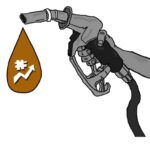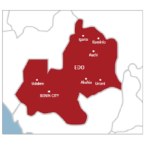
Never given to tobacco-smoking, never given to illicit wine, and never given to sniffing hard drugs, cancer should be a thousand years away from the skin, lungs and life of Pharmacist Monday Salifu James.Unlike yours sincerely, he was never even given to chewing either kola nut or ‘bitter kola’.But inexplicably cancer invaded Pharm Monday’s bowels. And the shockwave that tore through my senses when I learnt of it crushed the confidence I had developed that a clean lifestyle could keep cancer at bay.
It began one nasty morning in late November 2014. With a strange feeling that I hadn’t heard from Pharm Monday for over two weeks, I came under an instant, urgent pressure to put a call through to him. Why did I consider two weeks’ silence between Monday and I uncharacteristic? It was for a singular but vital reason: he was the first medical personnel I would consult when my daughter came under the weather or when my son sustained injuries from football field at school, or when water, boiled to wicked degree, splashed on my daughter’s leg from the gas cooker, or when my wife had running noses or when another child complained of stomach ache, or when I had to check my blood sugar level, or when a visitor to my house took ill… That means, at least, twice in a week, I would call Pharm Monday for free medical consultancy as initial measures to mitigate emergency health issues in my family.
To respond to my discomfort, I put a call through to Pharm Monday. Two times it rang out. The third time, he picked it. His voice cracked in pains like one chained with fetters to an iron. Without the kind of salutation that opens telephonic discourse, I asked what the problem was.
“I’ve got serious pains in my stomach,” he replied.
A pharmacist in anguish due to stomach pains? It sounded like another oxymoron. Still in my nightwear, I dashed into the car and drove to his house. I found him squeezed into a single settee cushion chair, gnashing his teeth, groaning and cursing. Furtively looking up at me and then back to his agony, Pharm Monday declared that he had been diagnosed with cancer of the liver.
That was the beginning of a long tortuous season of pains and frustration. The first time Pharm Monday noticed the sinister pains in his bowel was in August 2014. Nigerian laboratory technicians, after running series of tests came up with results which doctors interpreted to mean the young man suffered from ulcer. After four months of failed treatment, Pharm Monday ran further tests in November 2014. Doctors who deciphered the second series of tests said the pain he suffered was too severe and unrelenting to be attributed to ulcer. They prescribed a scan test. It was at this point that a kind of tumor was observed in the region around his liver.It was an unusual tumor which had to be investigated. Another tormenting procedure was carried out to sample the tumor and identify what it meant. The doctors discovered that for over four months Pharm Monday had been under pains from cancer of the liver.
So, what is cancer?How would we deliver Pharm Monday from the fang and fingers of this deadly disease? Which hospital in Nigeria was the best for cancer treatment? What’s the status of the sprawling structures of International Cancer Centre on Airport Road, Abuja? Where were the consultant-oncologists? How would we access experts on cancer of the liver? At what cost? A series of questions. Shockingly, the doctors who diagnosed Pharm Monday with cancer spoke in gloomy and gloomier voices that spread more hopelessness than our minds could bear. They pointed to the United States, United Kingdom, South Africa, Germany, United Arab Emirates, Egypt as countries that provided a glimmer of hope. For days, I queried google.com in diverse ways: What was cancer of the liver? What were its causes? What sorts of treatments were available? Where? At what cost? What were the chances of being cured? I read so much about cancer that I contributed intelligently to the eventual choice of hospital where we would seek help. We exchanged emails with prospective doctors and front desk staff of hospitals in India, scanned all Nigerian doctors’ reports and tests to them, explained as detailed as possible the extent of the pains, and attempted to predict with precision the kind to help Pharm Monday would receive. Of course, the Indian doctors almost provided a tempting schedule that was as certain as sunrise and sunset.
In December 2014, my cousin broke his bank account and flew to Appollo Hospital in New Delhi, India for sessions of treatments that lasted for almost four months. The first few weeks were frustrating to oncologists in New Delhi as the test results from Nigeria didn’t answer a fundamental question: What was the primary origin of the cancer? According to the doctors, without tracing its origin, any treatment would be like a blind dash into the unknown. The doctors in New Delhi worked their state-of-the-art machines to series of tests that could help answer that nagging question. Not quite certain about the primary origin of this cancer of the liver, they subjected Pharm Monday to a round of chemotherapy. Instead of raising my cousin’s hope, the measure collapsed and fell flat. After consulting other oncologists, the Indian doctors recommended and carried out an extreme measure – radiotherapy.
Pharm Monday returned to Nigeria in March 2015, looking gauntly and tired, though with the hope that the radiotherapy sessions had killed the cancerous cells in his liver. As a supplementary measure, he dragged into Nigeria sacks of assorted drugs, mainly recommended painkillers. He bought them in large quantities because they would not be available in pharmaceutical shops in Nigeria. Pharm Monday kept pace with all the prescriptions, slavishly swallowing dozens of capsules and tablets of anti-cancer drugs morning, afternoon and night. But it was not long before he was plunged into an inconsolable nightmare of pains that compelled me to shed secret tears every time I spoke with him on the telephone or met with him physically. As I would describe my encounters with him to everyone from whom I sought help, an hour with Pharm Monday left me with five hours of sorrow; the kind of sorrow that would dry up my appetite for meals; the kind of sorrow that left me with guilt for my inability to help mitigate or alleviate this young man’s suffering.
At another very difficult juncture we sought further help at the National Hospital, Abuja. The doctors suggested that elaborate chemotherapy was the way to go, saying the Indian doctors gave up on that line of treatment too early. My cousin subjected himself to six rounds of chemotherapy treatment. I didn’t realize what it all meant until I went to keep him company at the National Hospital. Chemotherapy meant raw poison pumped into my cousin’s body. It was a very painful process that would knock him down for days and force us to scamper for blood to be transfused into his body urgently to enable him regain minimal strength. Again, that ended in November 2015 without relief. We scouted around for another round of radiotherapy in Nigeria to no avail. At every point in time there was only one functional radiotherapy machine in our hospitals to attend to a long queue of cancer patients who flocked to such specialist hospital from all the nooks and crannies of Nigeria. But before long, the flicker of hope would be extinguished as the machine would break down. Frustrated patients spread out their ‘intelligence network’ to know which radiotherapy machine had become functional. Of course, such information would go viral. Cancer patients would take like a 100-metre dash to that hospital to place themselves at advantage over others before that machine would break down. I now saw through the reality of our health system – lack of equipment, qualified personnel and modern pharmaceutical drugs.
So, we arrived at a desperate moment, clutching to weak straws, praying and fasting, putting our ears to the ground about new lines of drugs peddled by Chinese and Indians who have taken over our herbal medicine trade. I read up every story of cancer survivors in Nigeria and overseas, and forwarded them to my cousin. They encouraged him. We discussed those survivors’ strategies and adopted some of them. Pharm Monday religiously obeyed all the recommended diets, but his health condition kept sliding for the worst. It turned out to be like the proverbial race before one’s mare to the market. It led to little profit and to his demise on Tuesday, March 15, 2016 at the Federal Medical Centre, Lokoja in Kogi State.
Born on February 6, 1972, Monday came away as a self-made man, having broken through the wall of poverty to pay his way through the torturous years of education to qualify as a Pharmacist at the University of Jos. Pharm Monday did everything within his ability to keep alive, mobilizing all resources and exercising every measure of faith that a man could muster, but he had to succumb to death through cancer. Two weeks ago, I didn’t imagine I would write a tribute, not about Pharm Monday. But that is life: no one ever knows what would happen in the next hour. In spite of all human knowledge and technological breakthroughs, we are still pawns in the hands of some unseen forces who determine our fate, no matter how hard we try to master our destiny. We are all vulnerable and perhaps, the most miserable of beings.But death cannot erase Pharm Monday from our memory. He’s alive in the good works he did for family members, friends, foes, widows and orphans. My cousin is dead, but he’ll be remembered for the good works he has done.
 Join Daily Trust WhatsApp Community For Quick Access To News and Happenings Around You.
Join Daily Trust WhatsApp Community For Quick Access To News and Happenings Around You.


